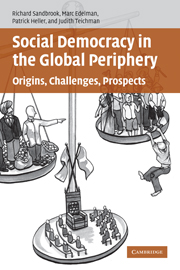9 - Prospects
Published online by Cambridge University Press: 22 September 2009
Summary
To succeed, social-democratic movements in the global periphery steer a course toward a society without widespread poverty or social exclusion, avoiding the two current utopian projects. The first utopia is a neoliberal fantasy, the self-regulating market. In the prescient words of Karl Polanyi, this utopia “would result in the demolition of society” with humanity “robbed of the protective covering of social institutions” and perishing “from the effects of social exposure” (2001 [1944], 74). The second utopia, subscribed to by some tendencies in the global justice movement, advocates “delinking,” “localization,” and “post-growth” as related strategies to achieve ecological sustainability, grass-roots democracy, and genuine community (Hines 2000; Amin 2001, 16, 26; Cavanagh et al. 2002; Hamilton 2004). In contrast, social democracy constitutes what the disillusioned Yugoslav communist, Milovan Djilas, approvingly called an “unperfect society” (1969). The pursuit of a perfect society leads to despotism, Djilas warned; far better, then, to opt for the perpetually “unperfect” society – such as those in Scandinavia – that pragmatically strive to reconcile liberty, equality, and community with the demands of a market economy.
Proponents of the self-regulating market utopia, though still highly influential, have recently seen their ideological hegemony eroded. This erosion was evident by the late 1990s in the increasingly heterodox declarations of its erstwhile architects (such as former World Bank chief economist Joseph Stiglitz and former “shock therapy” advocate Jeffrey Sachs); in the oft-noted neoliberal “reform fatigue” in developing countries; and in the growing criticism of neoliberal prescriptions by left-of-center governments and popular movements, especially in Latin America.
- Type
- Chapter
- Information
- Social Democracy in the Global PeripheryOrigins, Challenges, Prospects, pp. 232 - 254Publisher: Cambridge University PressPrint publication year: 2007



